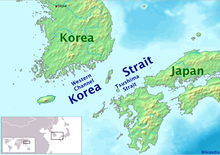Korea Strait
| Korea Strait | |

Map showing the Korea Strait.
|
|
| Japanese name | |
|---|---|
| Kanji | 対馬海峡 |
| Hiragana | つしまかいきょう |
| Revised Hepburn | Tsushima Kaikyō |
| North Korean name | |
| Chosŏn'gŭl | 조선해협 |
| Hancha | 朝鮮海峽 |
| Revised Romanization | Joseon Haehyeop |
| McCune–Reischauer | Chosŏn Haehyŏp |
| South Korean name | |
| Hangul | 대한해협 |
| Hanja | 大韓海峽 |
| Revised Romanization | Daehan Haehyeop |
| McCune–Reischauer | Taehan Haehyŏp |
The Korea Strait is a sea passage between Japan and South Korea, connecting the East China Sea and the Sea of Japan in the northwest Pacific Ocean. The strait is split by the Tsushima Island into the western channel and the Tsushima Strait (eastern channel).
To the north it is bounded by the southern coast of the Korean Peninsula, and to the south by the southwestern Japanese islands of Kyūshū and Honshū. It is about 200 km (120 mi) wide and averages about 90 to 100 meters (300 ft) deep.
Tsushima Island divides the Korea Strait into the western channel and the Tsushima Strait. The western channel is deeper (up to 227 meters) and narrower than the Tsushima Strait.
A branch of the Kuroshio Current passes through the strait. Its warm branch is sometimes called the Tsushima Current. Originating along the Japanese islands this current passes through the Sea of Japan then divides along either shore of Sakhalin Island, eventually flowing into the northern Pacific Ocean via the strait north of Hokkaidō and into the Sea of Okhotsk north of Sakhalin Island near Vladivostok. The water-mass characteristics vary widely because of the low-salinity waters of the southeast coasts of Korea and China.
Numerous international shipping lanes pass through the strait, including those carrying much of the traffic bound for the ports of southern South Korea. Both South Korea and Japan have restricted their territorial claims in the strait to 3 nautical miles (5.6 km) from shore, so as to permit free passage through it.
Passenger ferries travel numerous routes across the strait. Commercial ferries run from Busan, South Korea to Japanese ports including Fukuoka, Tsushima, Shimonoseki, and Hiroshima. Ferries also connect Tsushima Island with Fukuoka, and South Korea's Jeju Island with the Korean mainland. Ferries connecting Busan and Japanese cities with ports in China also traverse the strait.
...
Wikipedia
